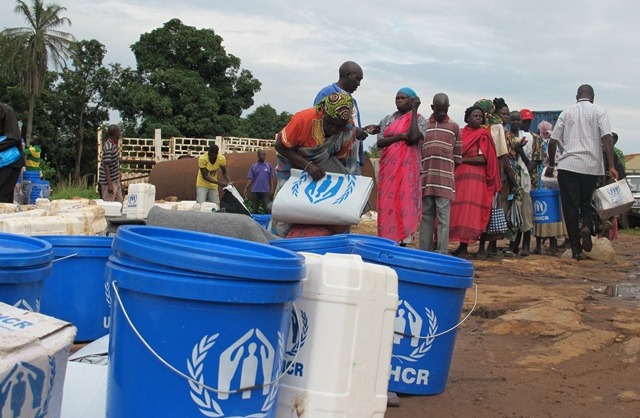UNHCR warns over dire humanitarian situation in Yei
October 1, 2016 (JUBA) – United Nations Refugee Agency (UNHCR) has warned of grave humanitarian situation in the newly established Yei River state of South Sudan due to the renewed fierce fighting between rival forces and continued attacks by government forces on civilians in the area.

According to the report, more than 30,000 people have been displaced into Yei from surrounding areas, following deadly attacks on civilians and looting of private property on 11 and 13 September. They joined several thousand others displaced from nearby Lainya County since mid-July, and up to 60,000 town residents who remain in Yei with no means to leave and who are now in as much need as those displaced by the conflict.
It said the populations in Yei have been targeted by the government forces under the leadership of President Salva Kiir with the suspicion that they are loyal to the deposed First Vice President, Riek Machar, who leads an armed opposition faction.
“The security situation in Yei deteriorated rapidly after renewed conflict broke out in Juba in early July and came to a head earlier this month, forcing thousands of civilians to flee their homes. This is the first time that the population in Yei – primarily farmers living on commercial and subsistence agriculture – has become a direct target of violence, and on suspicion of their belonging to opposition groups,” partly reads the report.
“They urgently need humanitarian assistance,” it added.
An inter-agency mission to Yei, led by UNHCR on Tuesday, 27 September, observed that tens of thousands of displaced people are sheltering in abandoned houses and smaller numbers in church compounds and are facing a serious shortage of food and medicine.
“Terrorized men and women spoke of horrific violence against civilians before and during their flight, including assault, targeted killing, mutilation, looting and burning of property. Several civilians have been hacked to death, including women and infants. There are reports that many young men, aged between 17 and 30, have been arrested on suspicion of siding with the opposition,” UNHCR report further reveals.
The displaced people, it said, need food, household items, medicines and the children need access to schools. Food prices are skyrocketing, with basic commodities quickly disappearing from the market.
“Many internally displaced people have reported that their food stocks have been looted. Two local hospitals are functioning at reduced capacity. Lack of high-energy food for malnourished children and breastfeeding mothers is becoming critical. As information continues to be gathered, there are indications of increasing sexual and gender-based violence, and unaccompanied and separated children.”
The population, the report added, is unable to leave the town due to limited freedom of movement and lack of resources.
“With farmers unable to reach their fields, harvests are rotting and the risk of missing the upcoming planting season is very high. This means that people may have no crops next year,” it observed.
However, in Juba, humanitarian partners are mobilizing to respond to the situation in Yei, including provision of food, non-food items and drugs, the report further informed.
The deteriorating security situation in South Sudan has forced more than 200,000 people to flee the country since 8 July 2016, bringing the number of South Sudanese refugees in neighbouring countries to over 1 million.
In South Sudan, more than 1.61 million people are internally displaced and another 261,000 are refugees from Sudan, DRC, Ethiopia, and Central African Republic.
(ST)
